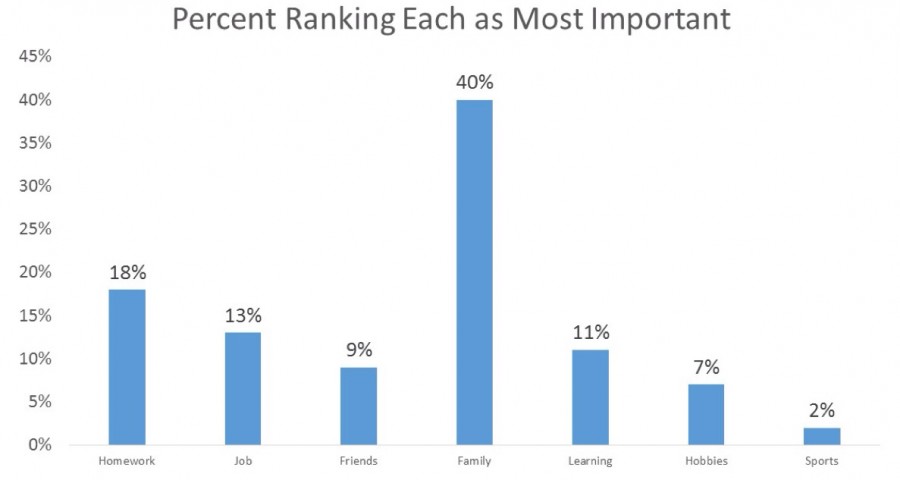Priority Crisis
When most people hear the words “teen” and “priorities” in the same sentence, they assume that what follows will be a criticism and a call to change. However, in a recent survey of Baldwin High School students and teachers, it was shown that many teens actually have a decent idea of where priorities should lie. Teachers also had an accurate idea of what students prioritized.
When asked to rank certain aspects of their lives in order of most to least important, family was the most chosen by students (40%) to be first. In the teacher’s surveys, the majority (64%) thought students would put family first. This seems to contradict common thought, as so many people seem to criticize and hound teenagers for not spending enough time with their parents or families.
The next most chosen topic was, surprisingly, homework. In fact, 18% of those surveyed said that this nuisance was most important in their lives. A substantial number of students (13%) also prioritize their jobs or careers above anything else. The rest of the options were learning (11%), friends (9%), hobbies (7%), and sports (2%).
As for teachers 36% said students would choose friends as their top priority. Only 9% thought students would choose learning, and none of those surveyed predicted that homework, jobs, hobbies, or sports would be a priority.
When the data was examined, there was found to be an inverse correlation between many of the options. This means that as the rank of one subject went up, the rank of another went down. The most statistically significant, or noteworthy correlations were between sports and friends, and sports and learning. In other words, when a person ranked sports first, they were more likely to rank friends lower and vice verse.
When asked whether students in general need to change where their priorities lie, the results were quite varied.
“Yes,” a junior said. “These priorities should change. It is more important to spend time with family, learn, focus on a career/time for yourself than worry about your grades.”
The general agreement between students seems to be that grades are seen as more of a priority than they should be and that learning and gathering experience is more important.
“Learning and experiencing new things is the most important thing,” a senior wrote. “Sure grades are important, but only until a certain point. After college, grades don’t matter. So you need as much knowledge and real-world experience as you can so you can get a job/career and make a difference.”
Many of the teachers surveyed said that students should learn how to balance their lives, so they have an equal amount of time spent on each rather than just focusing on one.
“I believe students need to learn how to balance their priorities,” a teacher said.
Another teacher agreed on the point of balance, but unlike what someone might think a stereotypical teacher would respond, they thought friends and family was just as important as one’s education.
“I believe that no matter what, the people that come in and out of our lives affect everything else that we try to accomplish, so family and friends are high on the list,” a teacher said. “With that being said, often students have trouble balancing these relationships with what they need to accomplish to achieve their goals.”
All in all, students and teachers at BHS believe family, learning, and an all around balance are essential to their lives. On the other hand however, the inconveniences such as grades and homework should not be thought of as irrelevant either.


